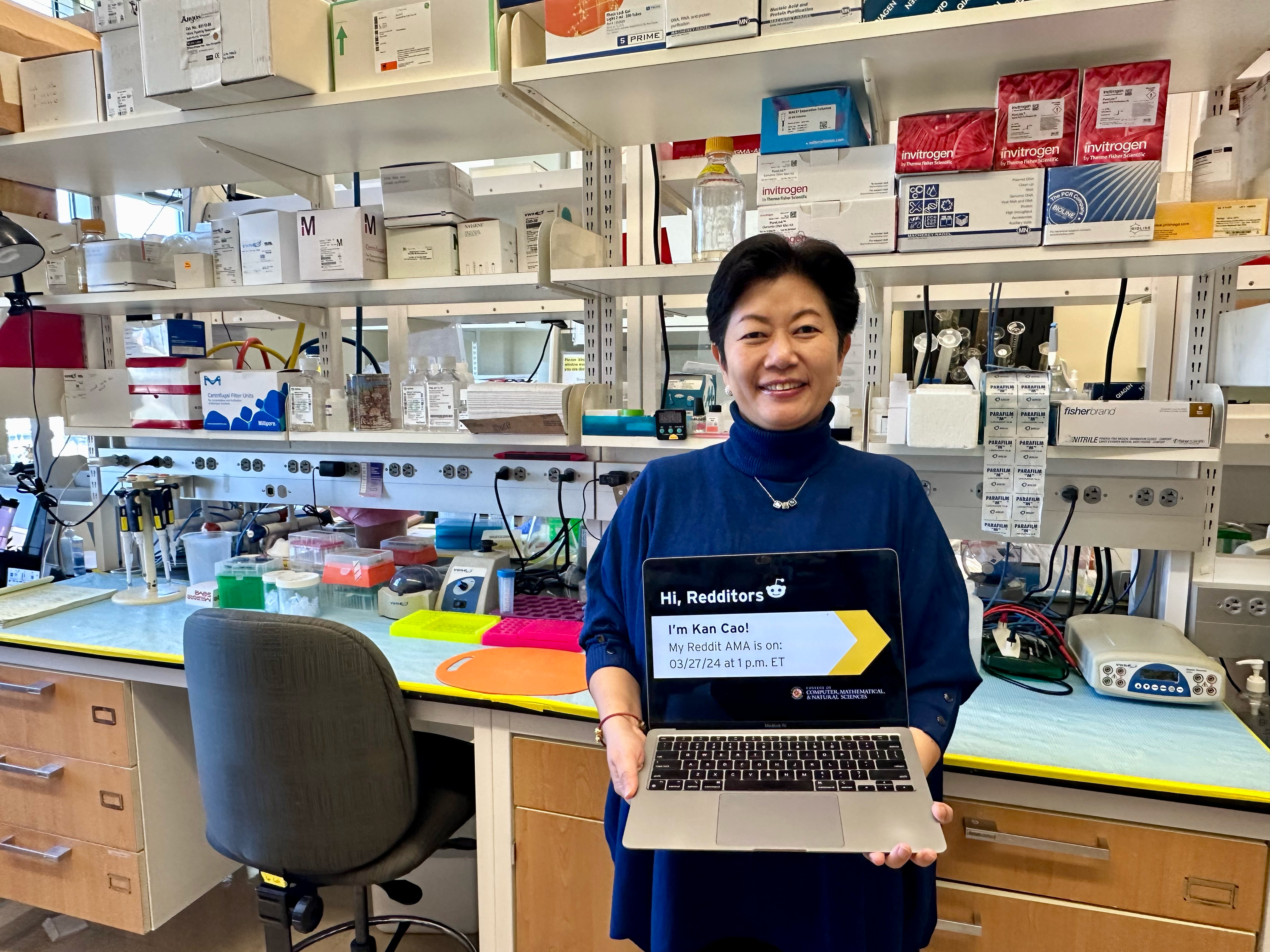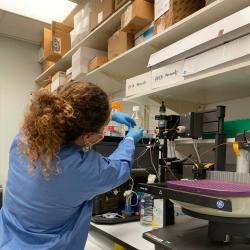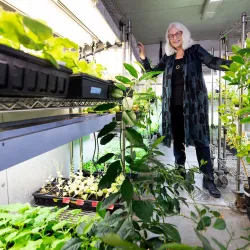Cell Biology and Molecular Genetics Professor Kan Cao Answers Questions About Human Aging
The College of Computer, Mathematical, and Natural Sciences hosted a Reddit Ask-Me-Anything spotlighting research on Hutchinson-Gilford progeria syndrome and aging.

University of Maryland Cell Biology and Molecular Genetics Professor Kan Cao participated in an Ask-Me-Anything (AMA) user-led discussion on Reddit to answer questions about human aging on March 27, 2024.
Cao’s research focuses on the molecular mechanisms of Hutchinson-Gilford progeria syndrome (HGPS), a premature aging disease, and the potential connections between HGPS and normal aging. While conducting this research, Cao’s lab discovered that a common dye, methylene blue, had incredible anti-aging properties for human skin. With support from UM Ventures, she started Mblue Labs and launched Bluelene Skincare, the first commercially available methylene blue anti-aging cream.
This Reddit AMA has been edited for length and clarity.
What exactly causes physical, visible aging?
Visible aging is a reflection and a good indication of the whole body's aging. Our skin is the largest organ of our body, and it is under the influence of both intrinsic and extrinsic aging. Skin aging is caused by intrinsic factors like hormones and extrinsic factors such as sun exposure and pollution. Our skin, especially our face and hands, is constantly exposed to external factors.
Based on my decades of research on methylene blue, I am a big fan of this magic molecule, which does wonders for our skin cells. When used at the optimized dosage, methylene blue can stimulate skin cell proliferation, prolong a healthy lifespan, promote collagen and elastin production, and help skin hydration and wound healing. In addition, my lab shows that methylene blue can absorb UVA and UVB lights similarly to the chemical active ingredient in our sunblock. And it is safe for coral!
In Asian traditional medicine, it is believed that certain areas of your face and hands are directly connected with or reflect the healthiness of certain internal organs. For example, the eyes are connected to liver health.
Sometimes you see someone visibly look younger and act younger with better health after getting away from a stressful situation or job. Is it possible to literally reverse aging in such a scenario?
Currently, aging appears unavoidable, yet researchers are increasingly uncovering its root causes and methods to decelerate its progression. It is evident that stress significantly contributes to both cellular and organismal aging. Excessive stress can trigger inflammation and DNA alterations, potentially fostering conditions such as cardiovascular diseases, cancer, and various other serious health issues. However, aging need not necessarily follow a linear path of decline. Our cells exhibit resilience and adaptability, capable of rejuvenation and repair despite adversity.
Is progeria sufficiently understood to be considered actual progressed aging or can it simply “look like” aging with some differential underlying mechanisms? In other words, how confident can we be when extrapolating to normal aging in the general population?
This is a question I get often. There are significant overlaps in terms of cellular pathways and regulations between premature aging progeria and normal human aging. For example, the elevated cellular stress and the increase in DNA damage—in my lab, in collaboration with Dr. Francis Collins at NIH and a few others, we have shown the presence of progerin, the mutant protein in progeria, in healthy human beings. This shows that there might be a shared molecular basis.
If you eat well, exercise and sleep well, and have some human connection, what else should you do to reduce the aging process?
That's a great question. Something we do not recognize as much is the stress levels in our bodies. There are external stresses, such as pollution, UV, and noise, that can be handled by proper personal care, and internal stress arises constantly from work, study, relationships, and disease.
Stress can induce gene damage and quicken our internal aging clock. Our healthy lifestyle, as mentioned in your question, helps to reduce some stress. On the other hand, minor stress can also stimulate the immune system and induce a stress response that can be beneficial to your body.
Does stopping aging or curing aging imply that we might not die from age and could live well over 1,000 years? If so, how is the research going? Is there any progress in the last five years and will artificial intelligence help you in this process to speed it up and make it easier? How close are we now?
The priority of research in human aging is to extend a healthy lifespan (no drastic deterioration of mind and body) as long as possible and ‘die fast.’
In my research about progeria, we are trying to use this accelerated aging model to better understand the process of aging, hopefully with the help of AI and machine learning. The potential of AI and machine learning in human aging research (or in any human health-related research) is huge and probably underestimated, and it will revolutionize disease diagnosis, drug testing/ screening, and clinical trials. Given the speed of this field, I think we are going to see big changes soon.
Is there any gene that regulates aging? And if we delete that, does it stop aging at the age the process is done?
I wish there were only one dominant gene regulating aging, but research has shown that aging is a complex process regulated by a variety of factors, such as stress, diet, and genes, through multiple interconnected pathways in the human body.
A commonly known facet of the mechanisms behind human aging is the shortening of telomeres. Many people believe it's the single most important (or even the only) process driving aging. How true is this and how has this idea developed in recent years? How important are epigenetics and the like believed to be in aging nowadays?
Shortening of the telomeres, at least in the in vitro study, serves as the clock to determine how long the cells stay proliferative (or alive). Inside the human body, proliferative cells, like our skin fibroblasts, have the same process as the cells in dishes. Since shortened telomeres are recognized as DNA damage and trigger genome instability, other adverse effects can be induced by shortened telomeres in our body, such as cancer.
Is the accumulation of DNA errors throughout our lifetime a significant process of aging compared to the development of cancer?
DNA damage is definitely one of the major causes of aging. DNA damage (or mistakes) occurs during cell replication, and it can normally be fixed by the DNA damage repair machinery. However, as we age, the incidence of damages and breakages increases, and the repair machine gets old. Either the senescence pathway, regulated by a bunch of cell cycle repressor genes, is up, or the cells may undergo unregulated division, which is cancer.
Back in the 1990s, I saw a lecture on aging at university. The speaker talked about a mid-life change to the mitochondrial membrane. It seemed like they gradually started leaking free radicals from the inside out into the cell, which they suggested could be a cause of aging. Has the field moved on from that?
Free radicals escaping from the mitochondria are still considered a major cause of cell aging. The magic of methylene blue is that it can capture these free electrons and recycle them back to the ATP production cycle. In this way, the reactive oxygen species caused by free radicals are significantly reduced, and the cells stay younger for longer.
What are the differences in potential breakthroughs vis-a-vis slowing aging versus reversing aging? For example, a certain therapy might be great for helping someone in their 20s to stay looking and feeling young longer, but once they're in their 60s, that particular therapy might bring no benefit.
As we age, cell proliferation slows down, along with many other processes within our bodies, including cell migration, collagen production, and energy generation. Consequently, certain treatments may yield faster and more pronounced results in younger individuals. Conversely, while some treatments can still benefit older populations, they may require slightly more time to manifest effects.
This is particularly evident in skincare. Each of us possesses a finite number of skin stem cells, and our skin renews itself approximately every 28 days. Continuously removing old skin cells and stimulating skin stem cells to generate new ones can impart a youthful appearance, but it also carries the risk of depleting stem cell reserves over time. This phenomenon is why individuals using retinol may experience increasing sensitivity with prolonged use. Conversely, methylene blue works to extend the healthy lifespan of skin cells by rejuvenating them at the molecular level, promoting increased ATP production, enhanced mitochondrial health, and reduced cellular stress. It is particularly suitable for sensitive skin, especially those overused with retinol







